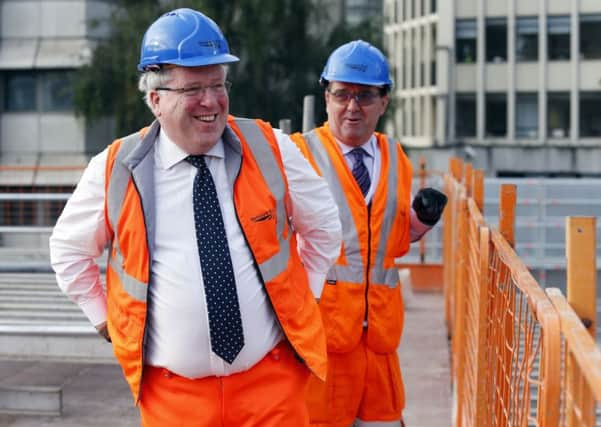Transport Secretary calling for high-speed spending on fast rail


Patrick McLoughlin told the Yorkshire Post there were a number of ways the Government may be able to bring forward the planned completion date from 2033 – but accepted the most obvious is to speed up the rate at which the Treasury releases funds for the £42.6bn scheme.
Mr McLoughlin was speaking on the day the main HS2 Bill was published at the House of Commons for the first time, attracting protest groups opposed to the new high-speed line to demonstrate outside Parliament.
Advertisement
Hide AdAdvertisement
Hide AdHe confirmed the incoming boss of HS2 Ltd, Sir David Higgins – currently the head of Network Rail – will be tasked with cutting costs and speeding up the construction timetable. And he acknowledged that could involve increasing the Treasury’s annual spending.
“That’s not far wrong,” he said. “But you can speed it up in other ways. Next year we move into a different phase when David takes over. There are things you can do about saving time and he will look at that. And these time-saving techniques can save you costs.”
The Government is committed to spending several billions of pounds a year on the construction of HS2 – effectively the same revenue stream currently funding the Crossrail project in London.
Speeding up the construction of the high-speed line may therefore require the Treasury to find extra money from its annual capital budget.
Advertisement
Hide AdAdvertisement
Hide Ad“Those conversations (with the Treasury) will be had when we get the plans,” Mr McLoughlin said.
The Transport Secretary appeared in the Commons briefly yesterday as the HS2 ‘Hybrid Bill’ passed its first reading.
The Bill is effectively a huge planning application for the first phase of the line, between London and Birmingham. At more than 49,000 pages, it is the longest Bill ever laid before Parliament,
Protesters in Westminster complained the eight-week public consultation on the Bill is too short, and does not give them enough time to read it in detail.
Advertisement
Hide AdAdvertisement
Hide AdStop HS2 campaign manager Joe Rukin said: “We have thousands of pages published on this Bill today, for which we get eight weeks’ consultation. Yet we have nine pages on tractor speed limits, for which there is a 12-week consultation. It’s madness.”
The complexity of the Bill means its progress through Parliament will be slow, with the Government facing a battle to ensure it passes through a special committee and into law before the next election.
But Mr McLoughlin said planning work is nevertheless well underway.
“I can’t tell you the progress it will make through Parliament once it goes to the Hybrid Bill committee – that’s up to the committee,” he said.
Advertisement
Hide AdAdvertisement
Hide Ad“But things have already started on HS2, and you can do a huge amount in the planning stages to make sure you get that right.
“Once you’re ready to start, you can hit the ground running. David Higgins is going to be conducting a review, both on costs and delivery, once he comes in.”
One possible way of cutting costs was floated this month by Government adviser Lord Heseltine, who said £10bn could be provided by private investment.
But transport union TSSA warned yesterday this could lead to higher fares, and called for HS2 to be kept in the public sector.
Advertisement
Hide AdAdvertisement
Hide AdUnion boss Miguel Cortes said: “This is a railway being paid for by every taxpayer in Britain, and everyone should be able to afford to travel on it.
“This must not become a rich man’s toy, solely for the benefit of businessmen. If we are serious about ending the North/South divide, it should be kept in the public sector, for the benefit of the public who will pay to build it.”